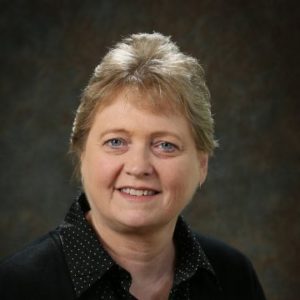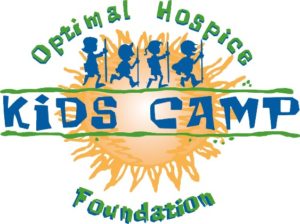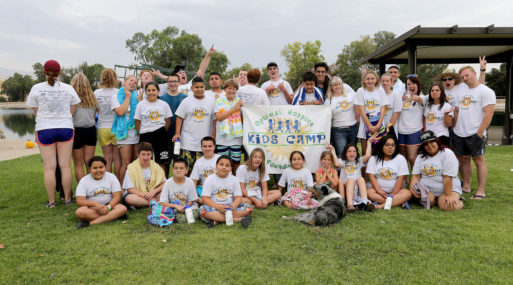Today SevenPonds talks to Cherie Shoemake about Kids Camp, a summer camp for grieving kids ages 8 to 16 who have recently experienced the loss of someone close to them. Cherie is the director of Optimal Hospice Foundation, the organization that runs Kids Camp. Cherie tells SevenPonds about the powerful impact camp has on campers’ grief journeys.

Cheri Shomake
Credit: sydex.net
Ellary Allis: Thank you so much for agreeing to speak with SevenPonds, Cherie. Can you start by explaining what Optimal Hospice Foundation is?
Cherie Shoemake: Optimal Hospice Foundation started in 1979 in conjunction with Optimal Hospice Care. Our main function is to provide funding for hospice care for patients who don’t have funding because of lack of insurance or insufficient insurance. So if a patient comes to us with a terminal illness and for whatever reason they don’t have insurance, our foundation steps in to pay a stipend to Optimal Hospice Care or any other hospice agency that is willing to take the amount that we pay. This way a patient can receive the same level of care that they would if they were on Medicare or Medicaid, or if they were a private insurance patient.
Ellary: Optimal Hospice Foundation runs a program called Kids Camp for children who have recently lost someone close to them. Will you describe what Kids Camp is?
Cherie: Kids Camp is a two-day program for children age 8 to 16 who have recently lost someone. We started in Kern Country, California, and just had our 25th year of camp. Our camps are an opportunity to bring together kids who have experienced the loss of a loved one and provide them a safe environment to help them either start their grief journey or help them along the way in that journey.
We do that by bringing them together with other kids who have experienced a loss and by providing them a really fun environment so that they can see that being a kid is sill important. They learn that experiencing joy and fun and all those things that go along with being a kid can coexist with grief. It doesn’t have to be one or the other. Sometimes after a loss, the home can turn into a place of so much sadness. And there is so much sadness in the adults who are around the kids that they can end up feeling guilty for being a kid and having fun. So these two days are about showing them that it’s OK to laugh; it’s OK to have a good time; and it’s OK to play games. That doesn’t take away from their grieving and their grief journey.
Ellary: Do you have explicit conversations with the kids about that or is it just kind of modeled for them?

Credit: optimalhospicefoundation.com
Cherie: We don’t say that upfront. What we say to them when they first come is, “Listen, we all know why we’re here. It doesn’t matter if you look left or right, the campers and the counselors all have something in common: We’ve all experienced the loss of a loved one.” It puts us all in the same boat. And with that statement alone it’s amazing to see the looks on the faces of the kids change. They realize that everyone in that environment understands on some level what they are going through. At school they might be in a class where no one has lost a parent or a grandparent or a sibling, and no one can relate to their loss. When they’re at camp, however, every single other person in that environment gets it.
At the end of camp we have a closing ceremony where we tell them all the things they’ve been doing at camp are coping skills. They’re all things we can do as human beings to help cope with the things that come our way: making new friends, trying things we’ve never done before; eating right; getting physical activity; going to bed on time; and getting plenty of rest. Those are things that we can take home to help us deal with our loss and with anything else life might throw our way. I think it’s more impactful to tell them afterwards, after they’ve already experienced it, versus trying to explain it to a 15-year-old on the first day, when they’re showing up to camp shut down and not listening to a word you say.
Ellary: What are some of the activities at Kids Camp?
Cherie: We have a rock climbing wall at all three locations. The rock climbing wall is such a great metaphor for grief. One of our mottoes at camp is “Just get on the wall.” It doesn’t matter how far you get. Even if it’s just two feet, it doesn’t matter. The point is to get off the ground and on the wall.

Credit: optimalhospicefoundation.com
It’s such a powerful metaphor because sometimes in our grief, we just don’t know where to start, and taking that first step is so important. We have kids that say, “Oh, I can’t do this.” But we tell them, “Just put on a harness and get on the wall.” And then all of a sudden they’re halfway up the wall before they even know what they’re doing. And we point that out along the way, and we’ll see this light come on in the kids’ faces.
We also make memory journals at camp, which are journals we give to the kids that they get to decorate. It’s up to them whether they make the journal about their loved one or about camp. We give them the power to decide what they want to write about.
We also do affirmations. So at night before bed, each kid gets a little slip of paper and every slip of paper has an affirmation on it. They’re given the opportunity to read their affirmation aloud or not; it’s their choice, but they’re all based on grief. We don’t sit down and do group therapy per say. If you suggest group therapy to a 15-year-old kid they’ll just look at you and say, “Yeah that’s not happening.”
Ellary: What does the second day of camp look like?
Cherie: By the second day, they’ve had an opportunity to chat with each other. At the beginning of camp we do an activity where we ask the kids to trace their hand on a piece of paper and then write their name and their age and the person who they lost inside the hand. We give them markers and they can decorate the hands however they want. Then we put those hands up in the bunkhouses where the kids are staying.

Credit: The Bakersfield Californian
It’s really interesting to see the kids go up to the wall and notice someone’s hand and say, “Hey you’re grandma died? My grandma died too.” Or, “I thought I was going to be the only one here who had lost a sibling. But look, there are three other people who have lost siblings.” It’s a way for them to initiate a conversation without having to just go up to someone and ask, “Hey, who died in your family?”
By day two they’ve already got that kind of stuff figured out, and it’s amazing how quickly they bond with one another. Knowing that everyone at camp has also lost someone makes it so much easier for walls to come down and for the kids to really create friendships. It’s amazing to watch the 14 and 15-year-olds. They show up on the first day with their arms crossed, not happy to be there, but by 10 a.m. on day two they’re are coming up to me and saying, “You know, I really didn’t want to come here, but I’m so glad I’m here.”
A few years ago we started a program where we bring kids who have aged out who we’ve identified as having some leadership skills back to camp to be junior counselors. I’ll get the 15 and 16-year-olds coming up to me by the afternoon of day two and asking, “What do I have to do to be a junior counselor?” That’s when you know it works, when you have kids who have been so impacted that they want to come back and help the next group.
This concludes part one of our interview Cheri Shomake. Please come back next week to read part two.

 What Is It Like To Run a Kids Camp for Grieving Children?
What Is It Like To Run a Kids Camp for Grieving Children?


 Final Messages of the Dying
Final Messages of the Dying
 Will I Die in Pain?
Will I Die in Pain?















